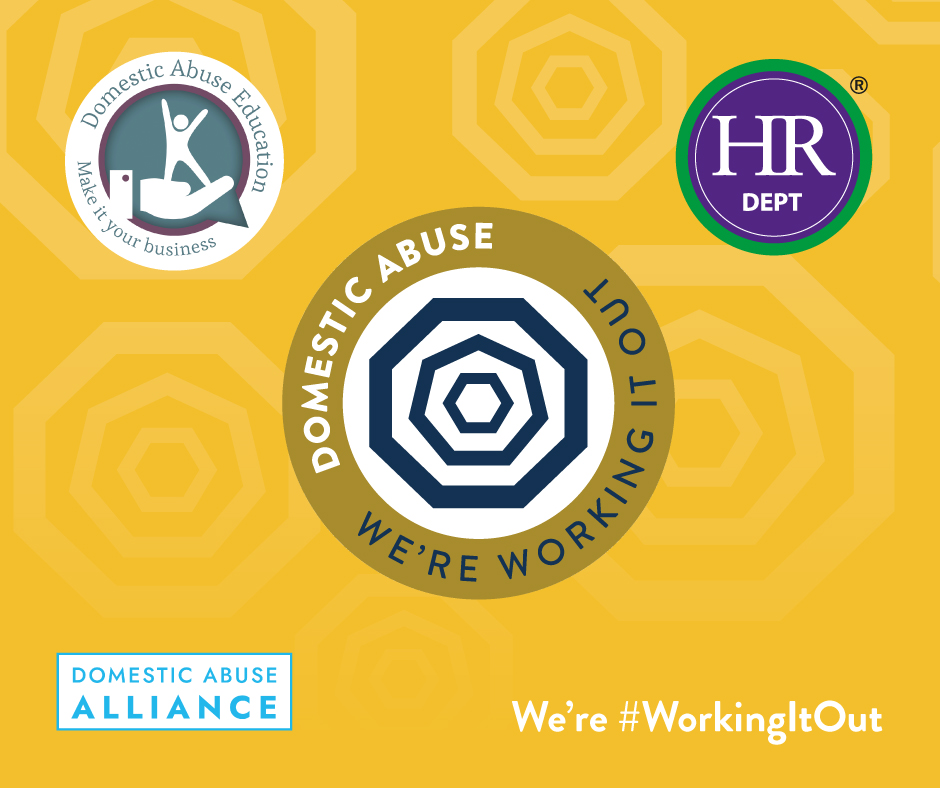Business owner and survivor of domestic abuse Sharon Livermore has launched a nationwide campaign to help employers tackle domestic abuse. The campaign, ‘Working It Out’, created in collaboration with the Domestic Abuse (DA) Alliance and outsourced HR provider The HR Dept calls on employers to sign up to a six-step pledge to support employees.
After being forced to take five days of annual leave to attend the court case of her abusive partner, Ms Livermore created ‘Sharon’s Policy’ in 2021. The policy enables businesses to improve workforce safeguarding procedures for victims of abuse.
The Working It Out six-step pledge invites employers to take action by:
- Becoming a member of the Employers’ Initiative on Domestic Abuse
- Introducing and embedding a domestic abuse policy in the workplace
- Ensuring all staff know where to get help if they are experiencing domestic abuse
- Raising awareness of domestic abuse among employees
- Publicly sharing their commitment to the Working It Out pledge
- Reporting back on activities and achievements annually
Following the introduction of the Domestic Abuse Act 2021, the Home Office published Domestic Abuse Statutory Guidance to increase awareness and inform the response to domestic abuse. The guidance highlights the important role employers have in helping victims of domestic abuse to remain in work, in the workplace itself, and to help victims access the support they need.
Sharon educates organisations by offering specialised training on domestic abuse and its impact on their workforces. She also provides strategies to help employees resolve the issue.
“Colleagues and managers can often be the only other people outside the home that survivors talk to each day and are therefore uniquely placed to help spot signs of abuse. Whether providing a safe space to disclose abuse or signposting to the right organisations for help, employers can be a vital link between an employee and the support they need,” explains Sharon.
“When I was experiencing domestic abuse, my employer couldn’t fully support me – because they didn’t understand what help I needed or how to provide it. The Working It Out pledge provides a platform for employers to actively demonstrate their commitment to raising awareness of domestic abuse and providing the right support so their employees and business can thrive,” she adds.
“Our collaboration with Sharon and The HR Dept on the Working It Out campaign is a powerful example of how people and organisations can partner to protect victims of domestic abuse,” says Razi Hassan, Director of Partnership and Communication for the DA Alliance. “By engaging with employers and providing them with practical tools and resources, we can ensure that those experiencing domestic abuse are identified and receive the help they need as soon as possible.”
“For many victims of domestic abuse, the workplace may be an escape from abuse at home. But with many of the UK workforce now working from home, employers also have the responsibility to ensure that the remote workspace is not only prosperous and productive, but also a safe place for their employees,” says Felicity Kenny, Managing Director of The HR Dept.
“By signing the Working it Out pledge, it demonstrates commitment as an employer to raising awareness of domestic abuse and having the resources available to provide help.”
Domestic Abuse: The Facts
- As many as one in five victims may need to take time off work because of abuse (Domestic violence and the workplace TUC 2014).
- One in four women and one in six men will experience domestic abuse in their lifetime (Domestic abuse prevalence and trends, England and Wales: year ending March 2020).
- An estimated 2.4 million adults aged 16 years and over experienced domestic abuse in England and Wales for the year ending March 2022 (Domestic abuse in England and Wales overview: November 2022).
- The social and economic costs of domestic abuse are estimated to be in the region of £78 billion (2022 to 2023 prices) over a three-year average period of abuse (Government response to ‘A Patchwork of Provision: how to meet the needs of victims and survivors across England and Wales’).
- Lost output relating to time taken off work and reduced productivity is estimated to cost the UK economy £14 billion (The Home Office: The economic and social costs of domestic abuse. Published 21 January 2019).
- In 2017, Vodafone Foundation published a report about the barriers that prevent organisations from doing more to support employees who are experiencing domestic abuse, as victim-survivors or as perpetrators. A link to the report can be found here: Domestic Violence and Abuse: Working together to transform responses in the workplace.
For further information about the Working It Out campaign and pledge and how you can get involved click here.






